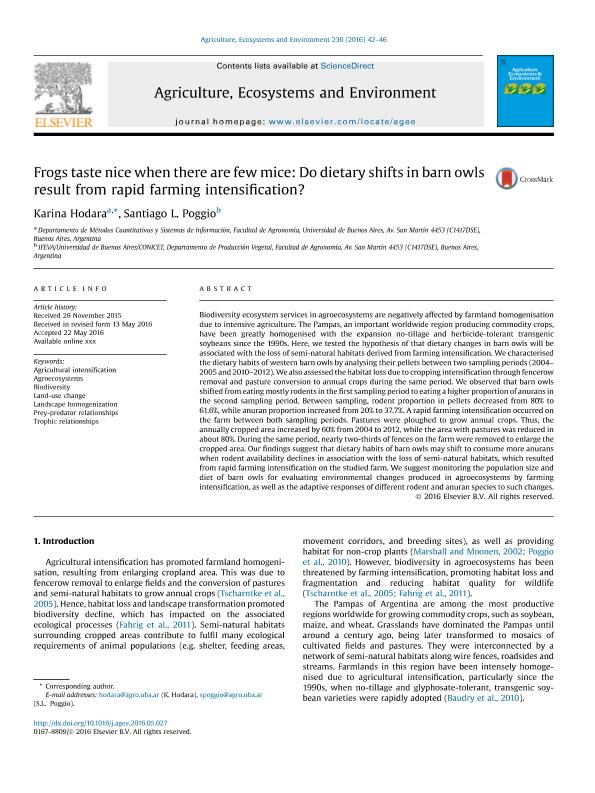Mostrar el registro sencillo del ítem
dc.contributor.author
Hodara, Karina

dc.contributor.author
Poggio, Santiago Luis

dc.date.available
2018-07-06T20:52:47Z
dc.date.issued
2016-08
dc.identifier.citation
Hodara, Karina; Poggio, Santiago Luis; Frogs taste nice when there are few mice: Do dietary shifts in barn owls result from rapid farming intensification?; Elsevier Science; Agriculture, Ecosystems and Environment; 230; 8-2016; 42-46
dc.identifier.issn
0167-8809
dc.identifier.uri
http://hdl.handle.net/11336/51554
dc.description.abstract
Biodiversity ecosystem services in agroecosystems are negatively affected by farmland homogenisation due to intensive agriculture. The Pampas, an important worldwide region producing commodity crops, have been greatly homogenised with the expansion no-tillage and herbicide-tolerant transgenic soybeans since the 1990s. Here, we tested the hypothesis of that dietary changes in barn owls will be associated with the loss of semi-natural habitats derived from farming intensification. We characterised the dietary habits of western barn owls by analysing their pellets between two sampling periods (2004-2005 and 2010-2012). We also assessed the habitat loss due to cropping intensification through fencerow removal and pasture conversion to annual crops during the same period. We observed that barn owls shifted from eating mostly rodents in the first sampling period to eating a higher proportion of anurans in the second sampling period. Between sampling, rodent proportion in pellets decreased from 80% to 61.6%, while anuran proportion increased from 20% to 37.7%. A rapid farming intensification occurred on the farm between both sampling periods. Pastures were ploughed to grow annual crops. Thus, the annually cropped area increased by 60% from 2004 to 2012, while the area with pastures was reduced in about 80%. During the same period, nearly two-thirds of fences on the farm were removed to enlarge the cropped area. Our findings suggest that dietary habits of barn owls may shift to consume more anurans when rodent availability declines in association with the loss of semi-natural habitats, which resulted from rapid farming intensification on the studied farm. We suggest monitoring the population size and diet of barn owls for evaluating environmental changes produced in agroecosystems by farming intensification, as well as the adaptive responses of different rodent and anuran species to such changes.
dc.format
application/pdf
dc.language.iso
eng
dc.publisher
Elsevier Science

dc.rights
info:eu-repo/semantics/openAccess
dc.rights.uri
https://creativecommons.org/licenses/by-nc-sa/2.5/ar/
dc.subject
Agricultural Intensification
dc.subject
Agroecosystems
dc.subject
Biodiversity
dc.subject
Land-Use Change
dc.subject
Landscape Homogenization
dc.subject
Prey-Predator Relationships
dc.subject
Trophic Relationships
dc.subject.classification
Otras Ciencias Biológicas

dc.subject.classification
Ciencias Biológicas

dc.subject.classification
CIENCIAS NATURALES Y EXACTAS

dc.subject.classification
Agricultura

dc.subject.classification
Agricultura, Silvicultura y Pesca

dc.subject.classification
CIENCIAS AGRÍCOLAS

dc.title
Frogs taste nice when there are few mice: Do dietary shifts in barn owls result from rapid farming intensification?
dc.type
info:eu-repo/semantics/article
dc.type
info:ar-repo/semantics/artículo
dc.type
info:eu-repo/semantics/publishedVersion
dc.date.updated
2018-06-22T14:39:50Z
dc.journal.volume
230
dc.journal.pagination
42-46
dc.journal.pais
Países Bajos

dc.journal.ciudad
Amsterdam
dc.description.fil
Fil: Hodara, Karina. Universidad de Buenos Aires. Facultad de Agronomía. Departamento de Métodos Cuantitativos y Sistemas de Información; Argentina
dc.description.fil
Fil: Poggio, Santiago Luis. Consejo Nacional de Investigaciones Científicas y Técnicas. Oficina de Coordinación Administrativa Parque Centenario. Instituto de Investigaciones Fisiológicas y Ecológicas Vinculadas a la Agricultura. Universidad de Buenos Aires. Facultad de Agronomía. ; Argentina
dc.journal.title
Agriculture, Ecosystems and Environment

dc.relation.alternativeid
info:eu-repo/semantics/altIdentifier/doi/http://dx.doi.org/10.1016/j.agee.2016.05.027
dc.relation.alternativeid
info:eu-repo/semantics/altIdentifier/url/https://bit.ly/2zfxsgR
Archivos asociados
